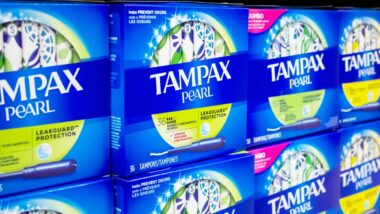Top Class Actions’s website and social media posts use affiliate links. If you make a purchase using such links, we may receive a commission, but it will not result in any additional charges to you. Please review our Affiliate Link Disclosure for more information.

Philips CPAP Class Action Lawsuit Overview:
- Who: Multiple consumers have filed class action lawsuits against Philips North America.
- Why: Consumers allege Philips put them at risk and failed to properly disclose that their breathing devices contained potentially hazardous PE-PUR foam.
- Where: The class action lawsuits were filed in Massachusetts, New Jersey, Maryland, and New York federal court.
Philips North America is facing four more class action lawsuits filed by consumers over the company’s June recall of fourteen of its positive airway pressure (CPAP) devices, bi-level positive airway pressure (BiPaP) devices, and ventilators.
Philips issued the recall after discovering the polyester-based polyurethane (PE-PUR foam) used to insulate the breathing devices could degrade into small pieces and/or emit toxic chemicals into users lungs.
The voluntary recall affected millions of Philips devices and has led to a bevy of class action lawsuits being filed against the company from consumers all across the nation.
Allegations include, among other things, that Philips was negligent by using PE-PUR foam to insulate its devices, that it had ignored users’ concerns that the devices were making them sick, and that users did not learn about the recall until weeks after it had been issued.
A new plaintiff in Massachusetts, Edwin Murray, meanwhile, claims Philips has been unresponsive on how consumers can get replacement devices.
Murray says he uses a Philips CPAP device on a nightly basis to treat his atrial fibrillation and severe sleep apnea, and that his doctor has warned him there would be severe consequences to his health if he were to stop.
After hearing about the recall, Murray says he attempted to use an older CPAP device but found it did not work well, and so he must continue using the Philips device, which he now worries may have made him sick.
Murray claims he remembers occasions where he inhaled or ingested black particles — which he believes was degraded PE-PUR foam — while using the CPAP device.
“The fact that he must continue to use the defective breathing device without knowing the deleterious health consequences he continues to be exposed to is a source of great distress to Mr. Murray and his wife,” the class action lawsuit states.
Philips told consumers in its recall that they should immediately discontinue using the CPAP and BiPaP devices and seek alternative ventilator options if they were being used for life-sustaining therapy.
Philips also revealed that potential side effects to PE-PUR foam exposure could include asthma, headaches, organ damage and toxic carcinogenic effects.
Philips Knew About the CPAP Defect ‘Well Before’ it Issued a Recall, a Class Action Claims
Another lead plaintiff, Tiffany Hood-Penderghest, claims in her class action lawsuit filed in New Jersey federal court that Philips knew about the issue with the PE-PUR foam well before it issued the recall.
“At a minimum, as a result of user reports, defendants knew of the off-gassing and degradation of the PE-PUR Foam used in the Recalled Devices many months if not years prior to the June 14, 2021 Recall,” Hood-Penderghest’s class action lawsuit states.
Hood-Penderghest claims that, despite knowing the danger it presented to consumers, Philips continued manufacturing and selling the devices.
Further, Hood-Penderghest says that manuals which came with the devices did not contain any warnings about the potential dangers of the PE-PUR foam, including that it could degrade or off-gas toxic substances.
Another plaintiff, San San Yu, echoed these claims in her class action lawsuit filed in Maryland federal court, alleging that Philips failed to properly inform her or her healthcare provider about the potential serious health risks from using the device.
Yu claims she used her Philips CPAP device everyday for around ten to eleven hours to treat her sleep apnea, and believes it ultimately caused her to develop thyroid and lung cancer, which she had surgery for in April and June of this year.
“Plaintiff, through the exercise of reasonable care, could not have discovered the conduct by Philips alleged herein,” Yu’s class action lawsuit states.
Plaintiff Michael Cornwell, meanwhile, claims in his class action lawsuit filed in Ohio federal court that his CPAP device lost its value, and, thus, on top of putting his health at risk, also injured him financially.
“As a result of the health risks associated with continued use of these devices and the recall, plaintiff’s Dream Station CPAP device is now worthless,” states Cornwell’s class action lawsuit. “Plaintiff either has replaced or will be forced to replace the device at considerable cost.”
Cornwell says he purchased the Philips CPAP device to treat his sleep apnea, and similarly claims he used his device regularly without knowing about any of the potential dangers associated with it.
The recall also concerned healthcare providers that have been dealing with breathing device shortages — such as ventilators — on account of the COVID-19 pandemic, reports Advisory Board.
Have you purchased a recalled Philips breathing device? Let us know in the comments!
The plaintiffs are represented by John F. Dew of Cohen Kinne Valicenti & Cook LLP, David Boies, George F. Carpinello, and Jenna C. Smith of Boies Schiller Flexner LLP, Samuel J. Strauss and Raina C. Borrelli of Turke & Strauss LLP, Simon B. Paris, Esq., and Patrick Howard, Esq. of Saltz Mongeluzzi & Bendesky, PC, Francesco P. Trapani, Esq. of Kreher & Trapani LLP, Raymond Yu, and Steven C. Babin, Jr. and Syreeta Poindexter of Babin Law, LLC.
The Philips CPAP Class Action Lawsuits are:
Murray v. Koninklijke Philips N.V., et al., Case No. 1:21-cv-11598, in the U.S. District Court for the District of Massachusetts.
Hood-Penderghest, et al. v. Koninklijke Philips N.V., et al., Case No. 1:21-cv-17401, in the U.S. District Court for the District of New Jersey.
Yu v. Koninklijke Philips N.V., et al., Case No. 1:21-cv-02503, in the U.S. District Court for the District of Maryland.
Cornwell v. Koninklijke Philips N.V., et al., Case No. 2:21-cv-04860, in the U.S. District Court for the Southern District of Ohio.
Don’t Miss Out!
Check out our list of Class Action Lawsuits and Class Action Settlements you may qualify to join!
Read About More Class Action Lawsuits & Class Action Settlements:
- Philips CPAP Equipment and SoClean CPAP Sanitizer Accused of Exposing Customers to Dangerous Toxins in New Class Action
- Consumers Traumatized Over Recalled, Cancer-Causing Philips Breathing Devices, Says Class Action
- Huggies Diaper Lawsuit Most Recent Baby Products Class Action, but 5 Others Top the List for Largest Settlements
- SoClean Uses Undeclared Toxic Gas in Its CPAP Cleaning Devices, Class Action Alleges















12 thoughts onClass Action Lawsuits Continue To Mount Against Philips Over Breathing Device Recalls
I have a Phillips dream station. They sent me a new one after all this started but I had stopped using the first one when it smelled funny. Had numerous infections
I have used a Philips Respironics System One Remstar Auto A-Flex SleepMapper in conjunction with a SoClean machine for several years. Upon learning of the recalls I quit using the SoClean Machine; respiratory problems I was having immediately started getting better. I still use the CPAP machine though, but I am going to buy a new unit of a different brand. I believe both machines have caused me significant heart and lung damage. I ma have to stqrt my own lawsuit, as I don’t think my machine is covered by the recall, but I do believe it has been injurious to my health. And I have no doubt that the SoClean machine has definitely harmed me.